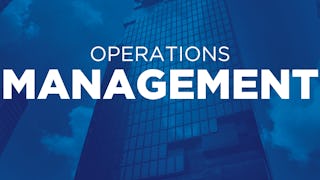Supply chain and operations are the bulk of what you see; it’s the hard work of turning ideas and strategies into tangible products for customers. How does the coffee bean turn into your Starbucks coffee? Answer: a LOT of operations


Mastering Business Essentials: Operations
本课程是 MBE Mastering Business Essentials 专项课程 的一部分

位教师:John Kim
顶尖授课教师
包含在 中
您将学到什么
Explain supply chain and operations to your cousin.
Find the 20% that drive 80% of results.
您将获得的技能
要了解的详细信息
了解顶级公司的员工如何掌握热门技能

积累特定领域的专业知识
- 向行业专家学习新概念
- 获得对主题或工具的基础理解
- 通过实践项目培养工作相关技能
- 获得可共享的职业证书

该课程共有5个模块
Supply chain is a massive topic; it describes the entire lifecycle of the product - from the raw ingredients, to the planning, manufacturing, and eventual distribution to the end customer. Remember that a cup of coffee started out as coffee beans. So, operations turns strategy into reality. Operations is difficult because it requires significant effort, coordination, risk, and trade-offs. The good news is that global trade increased 10x over the last 50 years. The bad news is that protectionism (e.g., tariffs) are on the rise and geopolitics can negatively influence free trade.
涵盖的内容
2个视频2篇阅读材料
The SCOR (Supply Chain Operations Reference guide) is a simple way to think about supply chain and organize it into buckets. Matching supply and demand “as accurately as possible” for all the different supplies, products, customers, locations. Buying all the necessary materials, equipment, labor to build bikes at the “right” quality and “right” costs. Manufacturing products “to specification” while running the factory flexibly, efficiently, and safely. Getting products to customers accurately, on-time, at lowest acceptable cost.
涵盖的内容
3个视频1篇阅读材料1个作业
Build-to-stock products are made in advance with the goal of creating economies of scale (and lower costs). Make-to-order products are built after the order is placed, to allow for more customization and less inventory. Services are “made” and “delivered” at the same time. It requires having enough of the right people to meet the demand. Digital assets are unique because it’s easy/cheap to copy and distribute widely to the second, third. . . thousandth customer.
涵盖的内容
3个视频1篇阅读材料
There are 3 parts to this module: 1) Economies of scale matter a lot in business. “The bigger you get, the cheaper you can make your products”. This is why many businesses try to keep growing. 2) In addition to this scale, there has also been drive to improve productivity through standardization. The Toyota Production System (TPS) revolutionized how cars were made by emphasizing quality as the most important production criteria. The idea was that quality was the “first domino” that led to better flow, lower costs. 3) Lean focuses on speed and efficiency. Six Sigma focused on accuracy and reliable. Both are useful and complementary.
涵盖的内容
4个视频1篇阅读材料1个作业
This is the last module in the specialization and it's focused on prioritization. We all know that it's easy to be distracted and waste time. It's important to focus on the “stuff that matters”. One way to do this is to focus on CTQ (what is truly critical) and also the 80/20 principle. Namely, what are the 20% of inputs that drive the 80% of outputs?
涵盖的内容
5个视频1篇阅读材料1次同伴评审
获得职业证书
将此证书添加到您的 LinkedIn 个人资料、简历或履历中。在社交媒体和绩效考核中分享。
位教师

从 Business Essentials 浏览更多内容
 状态:预览
状态:预览IESE Business School
 状态:免费试用
状态:免费试用Fundação Instituto de Administração
 状态:免费试用
状态:免费试用Rutgers the State University of New Jersey
人们为什么选择 Coursera 来帮助自己实现职业发展




常见问题
This specialization targets 3 groups of people:
1) New college graduates: get smart quickly on business essentials quickly, prepare for interviews, start strong with new jobs
2) Corporate managers: develop a broader, more executive view of the business challenges, make better decisions; persuade with data, influence others (departments / leaders), get more done with same resources
3) Entrepreneurs: find a gap in the market for your product/service, acquire customers and drive word-of-mouth, drive business profits
Albert Einstein famously argued that simplicity is difficult. "If you can't explain it simply, you don't understand it well enough."
As adults, we need to learn selfishly and continually relate content to our lives and careers. These videos are short, but cover the the basics very well, which allows you to take a first-principles approach to learning. As Einstein said, "Education is what you remember, when you forget everything you learned."
John Kim, is an associate professor in the practice, at Emory University. He is a management consultant by experience and passion. He's been teaching strategy, healthcare, and consulting since 2017.
He has a Management Consulting specialization here with 1,300+ reviews with a weighted average 4.9 star rating here.
His teaching style is interactive - yes, even with online videos - and wants you to succeed. See his teaching philosophy here.
更多问题
提供助学金,
¹ 本课程的部分作业采用 AI 评分。对于这些作业,将根据 Coursera 隐私声明使用您的数据。





